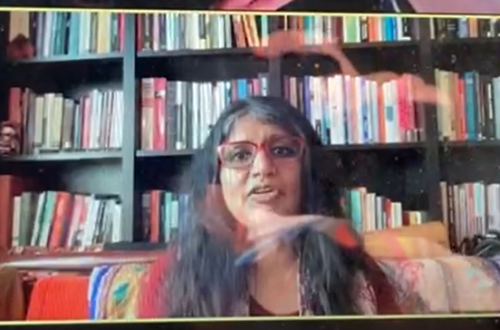In her recent post for the New Statesman Laurie Penny asserts that
Today, the rhetoric of free speech is being abused in order to shut down dissent and facilitate bigotry.
Free speech wouldn’t be up too much if it didn’t – in some sense – facilitate bigotry. But how is it shutting down dissent? Penny’s post left me none the wiser on this score. I am sure she would identify as a dissenter herself, and yet she has a regular column in the New Statesman.
The problem apparently stems from ‘liberals who don’t like the idea that they might have to update their ideas’. She quotes Marion James who explains that some mainstream writers are:
“Tired of learning new gender pronouns . . . Tired of having to figure out how to respond to a Rihanna video. Tired of feminists of colour pointing out fissures in whatever wave of feminism we got right now. Tired of black kids on campus whining all the time. Tired of everybody being so angry because without their alliance all you coloured folk would be doomed. Liberal but up to the point where it scrapes on privilege.”
In fact none of these responses (whatever one thinks of them) impinge on free speech – they are not shutting down dissent, but taking issue with it. Indeed from one perspective they are themselves dissenting voices. One category invoked by James, ‘feminists of colour’, is a very broad group as Laurie Penny once had to be reminded after the row about gender segregation at British universities:
This article was amended to draw attention to the fact that many Muslim and Asian women were involved in the “gender segregation” protests
Ageism doesn’t seem to be on Laurie Penny’s radar – here and elsewhere she pits youth against age, or middle age. As I read the article I felt rather like the irritated Karen Brady, who recently had to remind some candidates on The Apprentice that being fortysomething doesn’t mean you are scared of new ideas.
Here’s an interesting moment.
But liberals need a reason to think of themselves as just while ignoring alternative views, and “free speech’’ has become that reason.
‘Liberals’ is here used as a sneering term of disapprobation whereas earlier in her article Penny claims to speak on behalf of all with ‘liberal tendencies’. (Not in my name.)
She goes on:
I hear the phrase “freedom of speech” so often from people trying to shut down radicals, queers, feminists and activists of colour that the words are beginning to lose all meaning.
Who is being shut down? Not Germaine Greer, I assume. Perhaps this has something to do with the Prevent strategy or recent government legislation. If she wants to raise such concerns, fair enough, but she shouldn’t elide hate preachers with progressive activists even if she thinks the proposed measures are too authoritarian.
I don’t have time to go through her whole ‘listicle’, but here’s one particularly annoying one:
5. Freedom of speech does not mean that all views are of equal worth. The notion of a “marketplace of ideas” allows for the fact that some ideas are less worthy than others and can slip out of popular favour. The principle of free speech requires, for example, that we do not arrest a public figure for saying that transsexual women are disgusting – but it does not demand that we respect that public figure, or elect her to office, or invite her to give lectures. If what seemed progressive 20 years ago is deemed intolerant today, that simply means that the world is moving on.
Taken as it stands – I agree with much of this. I don’t agree with Germaine Greer’s stance on transexuality or on other issues such as FGM, and I don’t think people should be obliged to invite her to give lectures. But she was invited to give a lecture at Cardiff University – and some tried to close down her voice. Laurie Penny ignores the idea that supporting freedom of speech might mean supporting the rights of people you don’t agree with.
Finally – it’s just extraordinary that Penny asserts that
There is, in fact, a free speech crisis in the West.
without any reference to people who have been murdered for trying to assert the importance of that principle – whether or not you agree with what they were trying to say (or draw).


